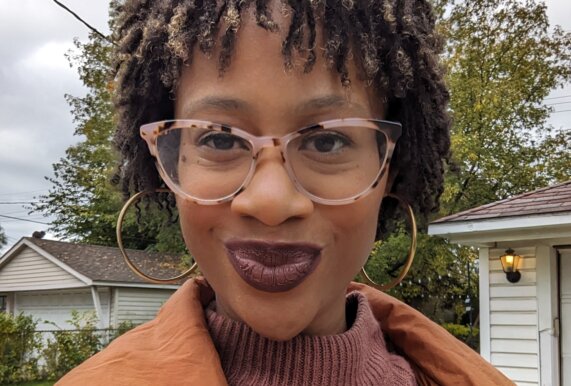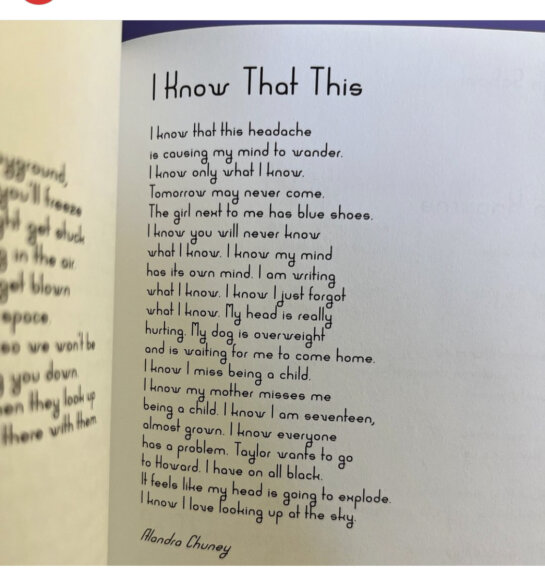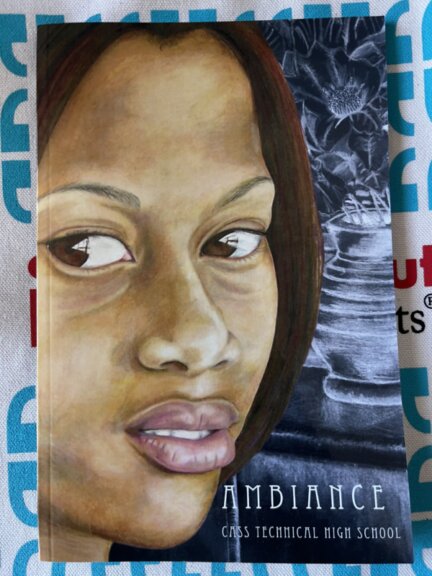
There is joy and liberation in the young people in Detroit. Art adds a human side to the social change that we are working towards.
Alandra Chuney-Jackson is an InsideOut alumni, the Co-Executive Director of the Youth Development Resource Center (YDRC) in Detroit, and the founder of the Sisters’ Couch – an organization dedicated to de-stigmatizing mental health for Black women. A Class of 2007 Cass Tech graduate, she began her career as a social worker before transitioning to the YDRC where she is able to effect deeper policy, systems, and environmental change for young people.
Looking back, Alandra recalls the specific day she wrote the poem “I Know That This” which was published in her high school InsideOut anthology:
I was 17. I am a triplet and we all attended Cass Tech. When I started in the program it was my senior year, my Mom had just moved to a different state and we were staying with my Dad. I knew I wanted to go to school for art or fashion but I wasn’t sure how I was going to get there. My younger self lacked the confidence to stand in my true self as it related to following an artistic career path.
I was in the class with my sister. I was also in an art class which is why my face lit up when we had InsideOut. My friend drew the picture on the cover of our anthology. Art and writing is such a core part of how I navigated high school.
I always had a love for poetry. On this particular day, I had a blaring headache and my head was on the desk. Looking back at that poem it was therapeutic. I wrote exactly how I felt at the moment. When we write, without thinking, we don’t realize how much it does for us in that moment.
In school, writing felt forced. However, during our InsideOut session, writing that poem was effortless. It was magic – and creatively, it allowed me to just BE. I didn’t feel forced to write for others.

I continue to use art as a coping mechanism during difficult times. I remember when the pandemic started I began making polymer clay earrings, writing in my journal, and bought an adult coloring book with water based markers. Since reading that poem, I thought ‘Alandra this is something you loved. You should get back to it without judgment.’ When we talk about rest, we think about sitting on the couch. Creative rest is a thing – tapping back into your creativity. After finding this poem I thought ‘how do I tap back into this creative rest?

As the Co-Executive Director of the Youth Development Resource Center Alandra’s work hopes to “improve the quality of Detroit-area youth-serving organizations to maximize their impact on youth and to advocate for accessible high-quality youth development opportunities.” InsideOut is a member of the YDRC and has partnered with them on youth designed and delivered programming in the past, like our Youth Advisory Board’s presentation “Blackness does not equal trauma.” Alandra spoke to the importance and power of programs like Citywide Poets from a new perspective, as an administrator dedicated to expanding youth programming:
We are in the midst of a mental health crisis in Detroit and Wayne County – the out of school time programs are critical for young people’s resilience. We know that, especially in Detroit, out of school time is where many young people learn to interact with adults, peers, and develop social-emotional skills. Out of school programming provides young people a sense of belonging and fosters critical thinking. It has a positive impact on students experiencing trauma or difficulty in the home. Personally, if it wasn’t for out of school time I wouldn’t have what I have now: my husband, my job, and my child.
She continued to discuss how writing and creativity are critical to the work she does serving people and pushing for social change.
Now I am currently in this space of leading a nonprofit in Detroit. The work I do is regimented…[and in that] we can lose connection to people. So in my role, art and writing have helped me to see the beauty of different stories and how they’re told. Especially in nonprofit work, the power comes from telling a story of the people in their own words.
It is important that organizations allow people to tell their own stories. Telling your own story humanizes the person to your donors and funders, and it empowers the storyteller to be an ally for themselves AND for our work. If you are commodifying people for fundraising it is antithetical to service. With people’s own words, we can help them empower, celebrate, and build autonomy.
Alandra reminds us that the work we do has far-reaching impact.
There is joy and liberation in the young people in Detroit. Art adds a human side to the social change that we are working towards.